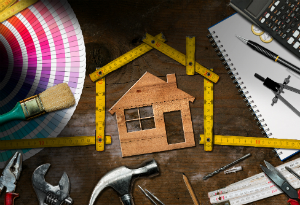Smart saving for home improvements
Due to Covid-19, we are all spending a lot more time at home and lockdowns have spurred people to save for home improvements. Wherever you are in your home improvements journey, we've got some great advice on getting started, planning and saving.

Since the arrival of Covid-19 we are all spending a lot more time at home with a vast majority of people now working from home. Tiring of looking at the same four walls, and with more time on our hands to tackle home improvement projects, many people are thinking about redecorating, changing the spare room into an office or building an extension to provide more room for the family.
Making improvements is part of the joy of home-ownership. If you plan correctly and save for the changes you wish to make, home improvement projects can be exciting and very rewarding, both mentally and financially.
If you are considering work on your house, don’t go further into debt. There may be lots of areas you’d like to improve in your home but adding debt to your circumstances is never a good idea. You may still be paying off your mortgage and could also have car loans, credit cards or other personal debts. Why compound the issue?
Instead, try and save some money to create the finances needed. It may take some planning and require some small personal sacrifices, but in the long run you will be in a better position financially once the project has been completed.
Here is a simple five step programme to get you started:
1. Make a list of desired home improvements.
2. Order them in terms of priority.
3. Set a clear budget for your project, allowing 5-10 percent for unforeseen extras.
4. Look at your monthly expenditure and highlight saving opportunities.
5. Start a savings plan.
Do not underestimate the importance of step number five. No matter how small the amount, it is crucial that you start the habit of saving.
Return on investment
A great motivator to start the savings habit is recognising that your home improvement project will add value to your property.
Before you dive into that living room conversion, for example, look at which projects give the best return on investment. This step can help your home improvements maximise your home's value.
Of course, if your living room or bedroom is so dated and an impractical use of space, then bump that up the list. Personal satisfaction can trump ‘Return on Investment’ in some cases.
Setting a budget
Very simply, work out how much you can afford to spend on the home renovation.
This sounds like a lot of common sense, but quite often projects start with a list of changes to be made rather than the price that can be afforded.
If you know exactly how much you are willing to spend or can afford, then you have a goal to save towards. This includes both materials and the work itself. Having a specific target is key here to avoid overspending.
We’ve all heard the cowboy contractor horror stories. Make sure you talk to family and friends and that you get recommendations - a thumbs-up from someone you trust is worth a lot. You’ll find most people who have invested in an extension will be very proud and willing to show it off.
When choosing a builder, shop around, get more than one quote. Again, this will take time but ultimately could save you thousands of euro.
When you‘ve chosen the right one, ask for a detailed quote. Don't just rely on a builder saying, ‘it'll cost around £10,000’. With a detailed breakdown, you match the payment phases of the agreed price to suit your budget.
Keeping your savings separate
This one is important and ties in with what we said earlier about creating a savings habit.
Managing your spending is not easy. If you try to discipline yourself to spending less every month eventually you will crack.
A better way to fund your home improvement project would be to put a small amount in a savings plan at the start of the month. You can gradually increase the amount you save over the years. In time you’ll adjust your spending habits so that you don’t even realise you are saving.
Creating a savings habit at the start of the month forces you to reduce needless spending elsewhere – that coffee shop latte only some days rather than every day, bring a homemade lunch to work some days rather than never, frozen pizza rather than a delivery at the weekend… you’ll be amazed at how quickly your savings will grow. This is how that attic conversion becomes a reality.
Take control of your spending
If you are not measuring, you are guessing. Using our budget calculator will really help you get a handle on your finances.
You’ll be amazed at how much you spend on things that, well, are not that important in the greater scheme of things. The joy of a new kitchen or reading the Sunday papers in that new conservatory will easily make up for these little sacrifices.
Putting a little aside every month will also cover you for those unexpected home repairs that can strain almost any budget. Being prepared for these unexpected costs just makes life smoother.
We all want to be the kind of homeowner that can replace a water heater or repair a roof without pulling out the credit card. Putting a little aside every month will let you add value to your home and bring you peace of mind.
Related articles
Filter by category
Follow us on
 Sending Response, please wait ...
Sending Response, please wait ...
Your response has been successfully submitted.
An error has occurred attempting to submit your response. Please try again.



